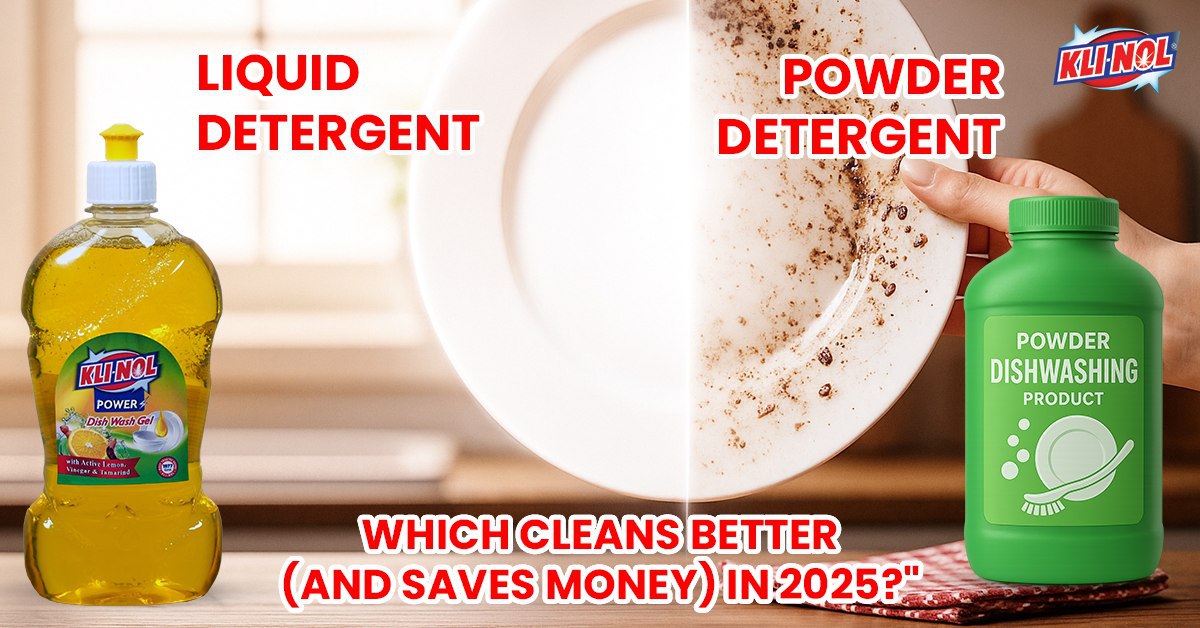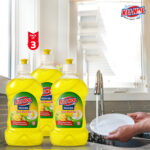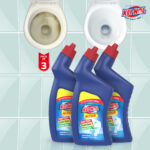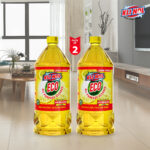Powder detergent typically cleans better for heavily soiled items and costs 20-30% less per load, while liquid detergent excels in cold water and protects colors better. Your choice depends on washing habits and budget priorities.
Are you tired of wondering whether you’re using the right detergent for your laundry needs? According to IMARC Group, “The Indian laundry detergent market reached USD 4.79 billion in 2024.” Choosing between dishwash liquid vs powder detergent is not just about cleanliness but about getting the best value in a growing market
In this blog, you will discover which detergent saves money, cleans better, and suits your laundry routine also, pro tips from top cleaning brands to get the best results.
Ready to choose wisely? Explore our housekeeping products for complete home care.
Key Takeaways
- a. Cost Efficiency
- b. Eco friendly Cleaning Liquids
- c. Environmental Impact
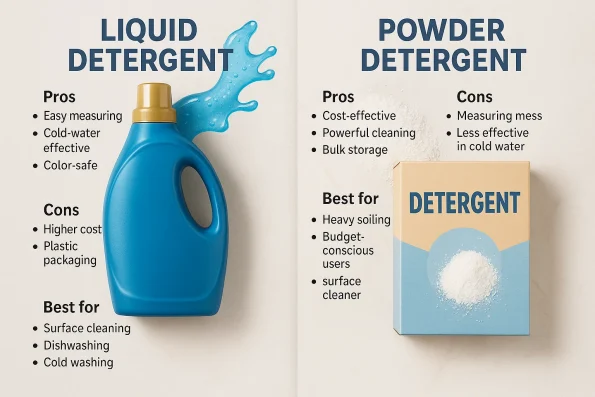
Liquid vs Powder Detergent
What is Liquid Detergent vs Powder Detergent?
Understanding the Basics
Dishwash Liquid detergent is a concentrated cleaning solution containing surfactants, enzymes, and additives suspended in water. Its gel-like consistency allows for easy dissolving in both hot and cold water temperatures. Many modern formulations also work as safe home cleaning liquid for multiple surfaces.
Powder detergent consists of dried cleaning agents, including surfactants, builders, and bleaching compounds, compressed into granular form. This traditional format has been the go-to choice for Indian households for decades, often serving as an effective powder floor cleaner alternative when diluted properly.
Manufacturing Differences
Liquid detergents undergo spray-drying processes that preserve enzyme activity, making them effective at lower temperatures. Powder detergents use tower-drying methods that create alkaline environments, enhancing their stain-fighting capabilities. For specialized cleaning needs beyond laundry, consider exploring our premium bathroom cleaning solutions that incorporate similar cleaning technologies.
| Feature | Liquid Detergent | Powder Detergent |
| Pros | Easy measuring, cold-water effective, color-safe | Cost-effective, powerful cleaning, bulk storage |
| Cons | Higher cost, plastic packaging | Measuring mess, less effective in cold water |
| Best For | Delicate fabrics, cold washing | Heavy soiling, budget-conscious users |

Detergent powder vs liquid Comparison
Liquid Detergent vs Powder: Cleaning Performance
1. Water Temperature Performance
According to studies by the American Cleaning Institute, powder detergent shows 35% better cleaning efficiency in hot water (above 60°C) compared to liquid alternatives. Additionally, Consumer Reports research confirms that powder detergents are especially efficient at removing stains like dirt, clay, and mud, while liquid detergents excel at dealing with grease and body soil. However, liquid detergent maintains consistent performance across all temperatures, making it ideal for cold-water washing.
Hot Water Advantage
Powder detergent’s alkaline compounds activate more effectively in higher temperatures, breaking down protein-based stains and ground-in dirt. This makes it an excellent choice for heavily soiled work clothes or sports uniforms.
Cold Water Champion
Liquid detergent’s pre-dissolved enzymes work efficiently even at 20°C, saving energy costs while maintaining cleaning standards. This feature also makes it suitable as an eco liquid floor cleaner when properly diluted.
2. Stain-Fighting Capabilities
Oil and Grease Removal
Liquid detergents contain specialized surfactants that penetrate oil-based stains more effectively. Their fluid nature allows better contact with fabric fibers, making them superior for kitchen textiles and cooking-related stains.
Mud and Ground-in Dirt
Powder detergents excel here, with abrasive particles providing mechanical cleaning action alongside chemical processes. This makes them ideal for outdoor work clothes and children’s play clothes.
Color Protection
Liquid formulations typically contain color-protecting agents and optical brighteners that maintain fabric vibrancy better than powder alternatives. For specialized fabric care, our premium household cleaning products offer targeted solutions.
3. Impact on Surfaces and Floors
Liquid detergents provide gentler cleaning for surfaces, while powder detergents can be slightly abrasive on floors. However, modern powder formulations have reduced this issue. Professional cleaning services often combine both types strategically for optimal results, though liquids generally deliver better care across surfaces, floors, and clothes.
Cost Comparison: Liquid Detergent vs Powder in 2025
1. Per-Load Economics
Recent market analysis reveals significant cost differences between detergent types:
| Detergent Type | Average Cost per Load | Annual Savings Potential |
| Powder Detergent | ₹4.50 – ₹6.00 | Baseline |
| Liquid Detergent | ₹6.50 – ₹9.00 | -₹800 to ₹1,200 more |
2. Bulk Surface Cleaner Benefits
Powder Advantage
Available in 5kg to 10kg packs, offering 15-25% savings over smaller quantities. Storage efficiency makes bulk buying practical for most households. Many commercial establishments prefer powder formulations for their cost-effectiveness and storage convenience.
Liquid Limitations
Heavy packaging and storage constraints limit bulk purchasing advantages, though concentrate formulations are improving this aspect. However, liquid options work better as multi-purpose cleaners for bathroom maintenance.
3. DIY Alternatives and Savings
Creating homemade cleaning solutions can reduce costs by up to 60%. Professional-grade ingredients used in commercial formulations can be purchased separately for custom safe home cleaning liquid preparation. Learn more about cost-effective cleaning through our comprehensive product guides.
According to the Indian Detergent Market Report 2024, households switching from liquid to powder detergents save an average of ₹960 annually without compromising cleaning quality.

Detergent Cost Comparison
Convenience Factor: Which is Easier to Use?
1. Measuring and Dispensing
Liquid Detergent Wins
Pre-measured caps and pour spouts eliminate guesswork and reduce waste. No powder clouds or measuring cup cleaning required. This convenience factor makes liquid ideal for quick laundry sessions and elderly users.
Powder Challenges
Requires careful measuring, can create dust, and measuring tools need regular cleaning to prevent buildup. However, the measuring process becomes routine with practice, and many users prefer the control over dosage amounts.
2. Storage Considerations
Space Efficiency
Powder detergents offer better storage density, with 2kg powder equivalent to 3-4 liters of liquid detergent. This space efficiency is crucial for urban households with limited storage.
Container Durability
While powder detergents often use recyclable cardboard, the Environmental Protection Agency notes that liquid detergent packaging has been improving rapidly. Concentrated formulas, refillable systems, and plant-based packaging are closing the gap and offering long-term sustainability advantages.

Eco Friendly Angle Liquid vs Powder Detergent
Eco-Friendly Angle: Liquid vs Powder Detergent
1. Packaging Environmental Impact
The Environmental Protection Agency reports that liquid detergent packaging generates 40% more plastic waste than powder alternatives. However, concentrate formulations are reducing this gap significantly.
Powder Advantages:
a. Bulk packs may reduce frequency but still require mining-based raw materials
b. Cardboard packs often lined with plastic for moisture resistance
c. Less adaptable to refill systems compared to liquid formats
d. Higher water and energy use in manufacturing than modern liquid concentrates
Liquid Improvements:
a. Concentrated formulas cut down packaging volume significantly
b. Refillable and returnable container systems reduce single-use plastic
c. Biodegradable surfactants and eco-label certifications becoming industry standard
d. Versatile eco liquid cleaners suitable for floors, kitchens, and multi-surface use
2. Chemical Considerations
Liquid detergents generally feature plant-based surfactants, lower phosphate levels, and higher biodegradability than powders. This makes them safer for waterways, aquatic life, and overall ecosystem balance. Powder detergents, by contrast, often rely on optical brighteners and builders that increase long-term environmental burden. For environmentally conscious cleaning solutions, explore our sustainable housekeeping products that minimize environmental impact.
3. Low-Waste Household Integration
Liquid cleaners integrate seamlessly with low-waste lifestyles through refill stations, concentrated pods, and multi-use formulations. Families adopting eco-conscious habits prefer liquids because they replace multiple products (laundry, floors, kitchen, bathroom) with one sustainable solution.

Safety Concerns at Home
Safety Concerns at Home
1. Child Safety Considerations
Liquid Detergent Risks
Detergent pods pose serious ingestion dangers. The American Association of Poison Control Centers reported over 10,000 pod-related incidents in 2023. Liquid formulations can also be mistaken for beverages if stored improperly.
Powder Safety
While less immediately dangerous, powder detergents can cause respiratory irritation if inhaled and require proper storage away from children. The dust particles can trigger asthma or allergic reactions in sensitive individuals.
2. Skin Sensitivity Issues
Liquid detergents generally cause fewer skin reactions due to lower alkalinity levels. Powder detergents’ higher pH can trigger sensitivity in individuals with delicate skin. For households with sensitive family members, consider specialized cleaning solutions formulated for sensitive skin.
Safety Tip
Always use recommended quantities and consider hypoallergenic formulations for sensitive family members. Store all cleaning products in original containers with clear labeling to prevent accidental ingestion or misuse.
Alternatives to Traditional Detergents
1. Natural DIY Solutions
Baking Soda Base Recipe
Mix 1 cup baking soda, ½ cup washing soda, and ½ cup grated soap for effective powder floor cleaner alternative. This combination provides gentle yet effective cleaning power without harsh chemicals.
Vinegar Enhancement
Add white vinegar as fabric softener and natural deodorizer. This creates a complete safe home cleaning liquid system that works for both laundry and general household cleaning.
2. Commercial Eco Liquid Floor Cleaner Options
Modern eco-detergents combine the best aspects of traditional formulations with environmental consciousness. Many brands now offer concentrated tablets that dissolve completely, eliminating packaging waste. These innovations bridge the gap between liquid vs powder detergent performance while maintaining eco-friendliness.
For professional-grade alternatives, explore our complete range of household solutions that offer both effectiveness and environmental responsibility.
3. Subscription and Bulk Surface Cleaner Services
Detergent subscription services offer convenience and cost savings, typically providing 10-15% discounts over retail prices while ensuring consistent supply. Bulk purchasing options reduce packaging waste and provide better value for large families or commercial users.
Best Situations for Each Detergent Type
1. Optimal Use Cases
Choose Powder Detergent When:
- Hot Water Washing: Maximizes cleaning efficiency for heavily soiled items
- Heavy Soiling: Construction, gardening, or sports clothes benefit from powder’s mechanical action
- Budget Priority: Cost-effective cleaning for large families with high laundry volumes
- Bulk Storage: Space available for large containers and combo surface cleaner quantities
Choose Liquid Detergent When:
- Cold Water Washing: Energy-efficient washing routines with consistent performance
- Delicate Fabrics: Silk, wool, or synthetic blends requiring gentle treatment
- Convenience Priority: Quick measuring and no cleanup for busy households
- Color Protection: Maintaining fabric vibrancy in colored garments
2. Specialized Applications
For floor cleaning and surface maintenance, different rules apply. Powder cleaners excel on textured surfaces, while liquid formulations work better on smooth surfaces requiring streak-free results. Many professional cleaning services, like those offering specialized toilet cleaning solutions, combine both approaches for optimal results.
3. Safe Home Cleaning Liquid Applications
Liquid detergents can serve dual purposes when properly diluted for general household cleaning. However, specialized formulations provide better results for specific tasks. Consider dedicated products for different cleaning needs to ensure optimal performance and safety.
Frequently Asked Questions
Is liquid detergent better for washing machines?
Liquid detergent dissolves more completely and reduces residue buildup in washing machine components. However, using proper amounts of powder detergent poses no machine damage risks. Regular cleaning cycles with vinegar help maintain machine performance regardless of detergent type. For comprehensive machine maintenance, consider specialized cleaning products designed for appliances.
Which lasts longer: liquid or powder detergent?
Powder detergent typically offers 20-30% more washes per package due to concentrated formulation. A 2kg powder box provides approximately 40-50 washes, while equivalent liquid detergent offers 30-35 washes. Storage stability also favors powder detergents, making them ideal for bulk surface cleaner applications.
Can I use liquid detergent as a safe home cleaning liquid?
Liquid laundry detergent can substitute for general cleaning tasks when diluted appropriately. Mix 1 tablespoon per cup of water for surface cleaning. However, specialized cleaners like our professional household products provide better results for specific tasks.
What is the best powder floor cleaner alternative?
Baking soda mixed with essential oils creates effective powder floor cleaner alternatives. Commercial enzyme-based powders offer superior results for pet stains and organic matter. Always test on inconspicuous areas first. For professional results, consider specialized floor cleaning solutions designed for different floor types.
Is buying bulk surface cleaner really cheaper in 2025?
Yes, bulk purchasing typically reduces costs by 15-25% compared to individual packages. However, factor in storage space, usage rates, and product expiration when calculating true savings. Industrial-grade concentrates offer maximum value for heavy-use scenarios, especially for commercial applications or large households.
Final Verdict
After analyzing cleaning performance, costs, and environmental factors, the choice between dish cleaning liquid vs powder detergent depends on your specific priorities and washing habits. You prioritize cost savings, wash in hot water, and handle heavily soiled items regularly. The 20-30% cost advantage and superior stain-fighting power make it ideal for budget-conscious households. Powder also works excellently as a bulk surface cleaner for general household use.
Convenience, cold-water washing, and fabric care are priorities. The easier measuring, better color protection, and consistent performance across temperatures justify the higher cost. Liquid formulations also serve as effective safe home cleaning liquid when properly diluted.
Ready to optimize your cleaning routine? Explore our professional-grade cleaning solutions designed for Indian households, combining the best aspects of both liquid and powder formulations for maximum efficiency and value. For specialized needs, browse our complete product guide to find the perfect cleaning solution for every area of your home.

